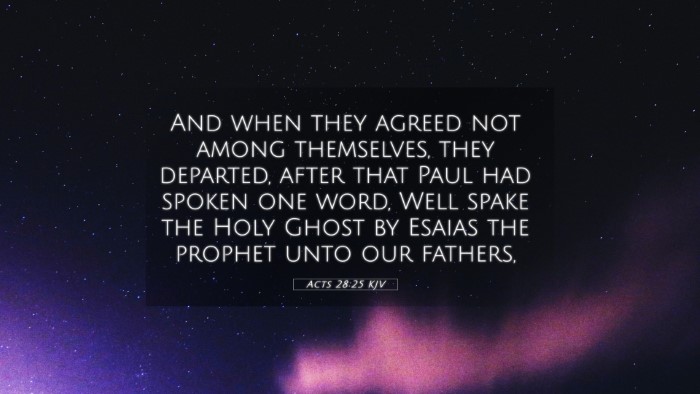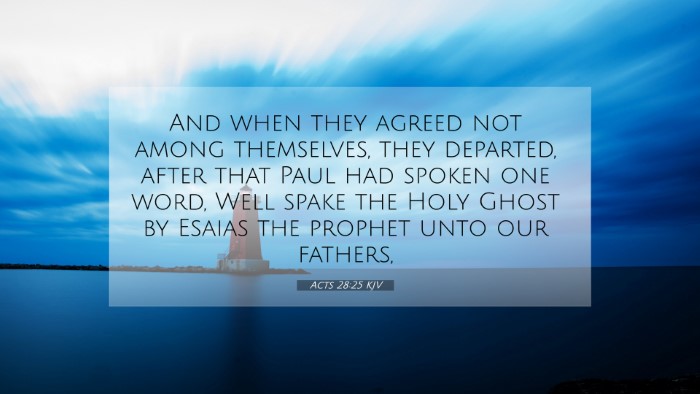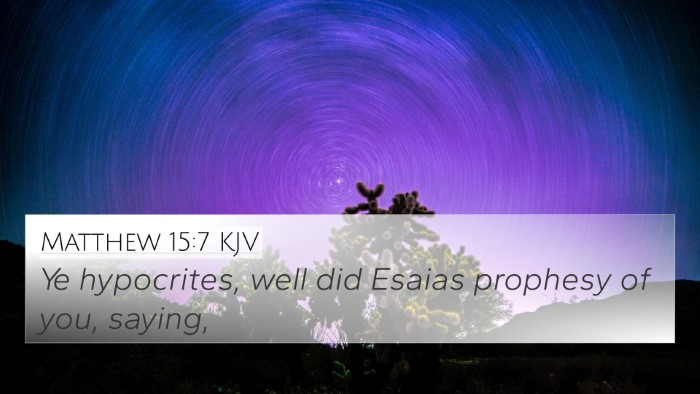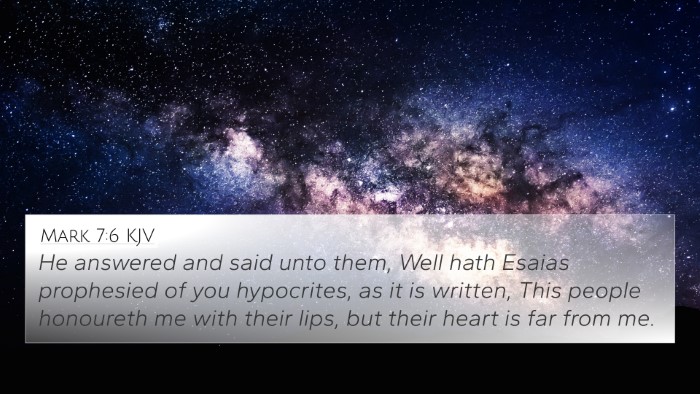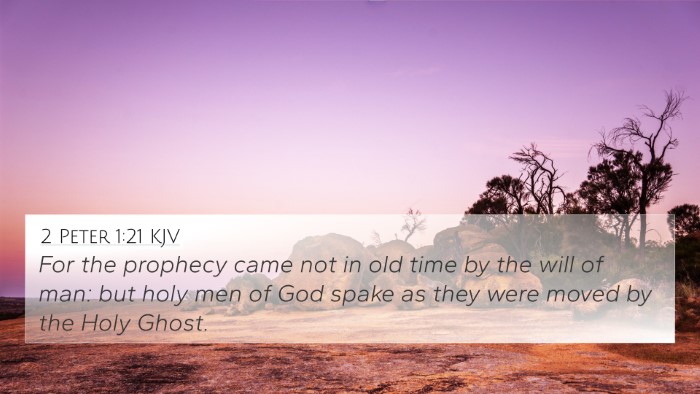Understanding Acts 28:25
Verse Reference: Acts 28:25 - "And when they agreed not among themselves, they departed, after that Paul had spoken one word, Well spake the Holy Ghost by Esaias the prophet unto our fathers."
Summary of Meaning
Acts 28:25 is a pivotal verse that captures the essence of Paul's final address to the Jewish leaders of Rome. This passage not only highlights the division among the listeners but also emphasizes the prophetic fulfillment of Isaiah’s message, indicating the broader theme of rejection that permeates the New Testament. Paul’s declaration points to the divine truth of God’s message being resisted by those to whom it was sent, which echoes the ongoing tension between the proclamation of the Gospel and the hardness of heart observed among some groups.
Commentary Insights
- Matthew Henry: Henry comments on the significance of the "one word" that Paul spoke. This one proclamation encapsulated the essence of the message relayed by the Holy Spirit through Isaiah, signifying that despite their disagreement, God’s word stands firm and cannot be silenced. Henry emphasizes the importance of remaining steadfast in one's faith, even in the face of opposition.
- Albert Barnes: Barnes discusses the concept of the Holy Spirit speaking through the prophets, illustrating how the prophetic words of Isaiah serve as both a warning and a comfort. He notes that the rejection of the message is a recurring theme in scripture, demonstrating the consistent struggle between God’s truths and human disbelief. Barnes points out that Paul's situation reflects a broader narrative of miscommunication and misunderstanding in spiritual contexts.
- Adam Clarke: Clarke elaborates on the nuances of the phrase "agreed not among themselves," indicating a significant barrier in reaching consensus on spiritual matters. He underscores the importance of unity in understanding God’s Word and the consequences that arise from division. Clarke also stresses the relevance of Isaiah's prophecy about spiritual blindness, further pointing to its implications for both the Jewish audience and the Gentile believers.
Cross-References
Acts 28:25 has numerous connections with other key scriptural passages that deepen the understanding of this verse:
- Isaiah 6:9-10: This passage describes the hardening of hearts, closely linking to Paul's reference, highlighting the persistent theme of God’s message being unreceived.
- Jeremiah 7:26: Similar to Isaiah’s message, Jeremiah laments the people’s refusal to listen to the prophets, reinforcing the historical patterns of refusal to divine truth.
- Matthew 13:14-15: Jesus quotes Isaiah concerning the people's insensitivity, illustrating how this spiritual blindness continues into the New Testament.
- Acts 13:46: Paul speaks again to the Jews, emphasizing that since they reject the word of God, the message will go to the Gentiles, paralleling the rejection theme in Acts 28:25.
- Romans 10:16: Paul reflects on the disobedience of the people, tying the Jews' rejection of the Gospel back to the prophetic warnings found throughout the scriptures.
- 2 Corinthians 4:4: Paul discusses the blindness that prevents people from seeing the light of the glorious Gospel, echoing the sentiments expressed in Acts 28:25.
- Hebrews 4:2: The message of faith did not profit those who heard it because of disobedience, linking closely with the rejection theme pointed out in Acts.
Connections and Themes
This verse encapsulates many themes that recur throughout both the Old and New Testaments:
- Prophetic Voice: The idea that God speaks through prophets and that their messages are often met with resistance.
- Rejection of God’s Word: A continuous thread in scripture where divine truth encounters human obstinacy.
- Spiritual Blindness: The inability or refusal to recognize the truth as it is revealed in scripture.
- Unity in Understanding: The call for believers to seek consensus and clarity in interpreting divine revelations.
- Faith and Disobedience: The challenge of faith that arises when faced with competing beliefs or resistance to God's word.
Practical Applications
Understanding Acts 28:25 can enhance one's study of scripture in various ways:
- Encouraging Relational Dialogue: Promote conversations around spiritual beliefs and understand why disagreements occur.
- Emphasizing the Importance of Prophetic Messages: Recognizing and valuing the lessons from the prophets can guide personal faith journeys.
- Fostering Unity: Strive for consensus in discussions about faith, cultivating environments where the word of God can be received more openly.
- Strengthening Faith Amidst Opposition: Equip believers with the truth of God's word as a defense against disbelief and skepticism.
Conclusion
Acts 28:25 serves as a profound reminder of the ongoing dialogue between God and humanity, encapsulating the divine message’s tension when met with resistance. By examining this verse in light of the broader biblical narrative and the insights from prominent commentators, believers are encouraged to explore the themes of prophecy, rejection, and spiritual insight while appreciating the collective wisdom that interlinks various scriptures.

